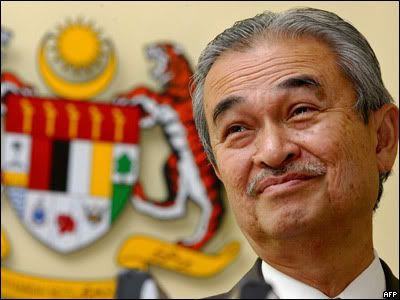
"...the Sedition Act can be enforced in the Dewan Rakyat,
in other words, the Sedition Act is also applicable in the Dewan Rakyat."
-Abdullah Ahmad Badawi, Prime Minister of Malaysia
We say,
We seek legal opinion, from the Bar Council and others, on the extent of the constitutional powers of the Executive to cause security instruments of Government to charge sitting Members of Parliament speaking in the Dewan Rakyat under the Sedition Act.
Can a Member of Parliament's right of free speech during Parliamentary sessions be gutted by the Sedition Act or any other Act for that matter, as mentioned by the Prime Minister?
We want to know.
What is MP Zaid Ibrahim, the de-facto Minister on legal matters, have to say on this?
As far as we know, under parliamentary democracy which Malaysia adopts from the Westminster system, Members of Parliament speaking in the House (Dewan Rakyat) "are protected by parliamentary privilege, which means they cannot be taken to court for anything they say. This enables them to comment freely on public affairs and to make accusations on individuals. "
-Malaysian Unplug
Bernama reported Prime Minister Datuk Seri Abdullah Ahmad Badawi yesterday reminded members of Parliament not to debate on issues touching on racial sensitivity at the Dewan Rakyat sitting as the Sedition Act could be enforced in the august house.
He said,
“They (MPs) must ensure that the debate is of quality and at the same time remember that issues that can raise racial sensitivity, issues that breach the Sedition Act must be avoided.
This is because the Sedition Act can be enforced in the Dewan Rakyat, in other words, the Sedition Act is also applicable in the Dewan Rakyat.
They are not free to talk on anything that breaches the Act.
If you don’t know and speak wrongly (in the debate), then there is no meaning, it gives no significance at all. They (members of parliament) must be firm and confident to come up with good debates.
Those who utter such words are also admonished by the Speaker.Don’t speak as you like, waiting for the Speaker to reprimand, don’t speak on matters that will invite a reprimand from the Speaker.
Such words cannot be used in Parliament. It is unparliamentary. That’s why I said they should read the Standing Orders."
No comments:
Post a Comment